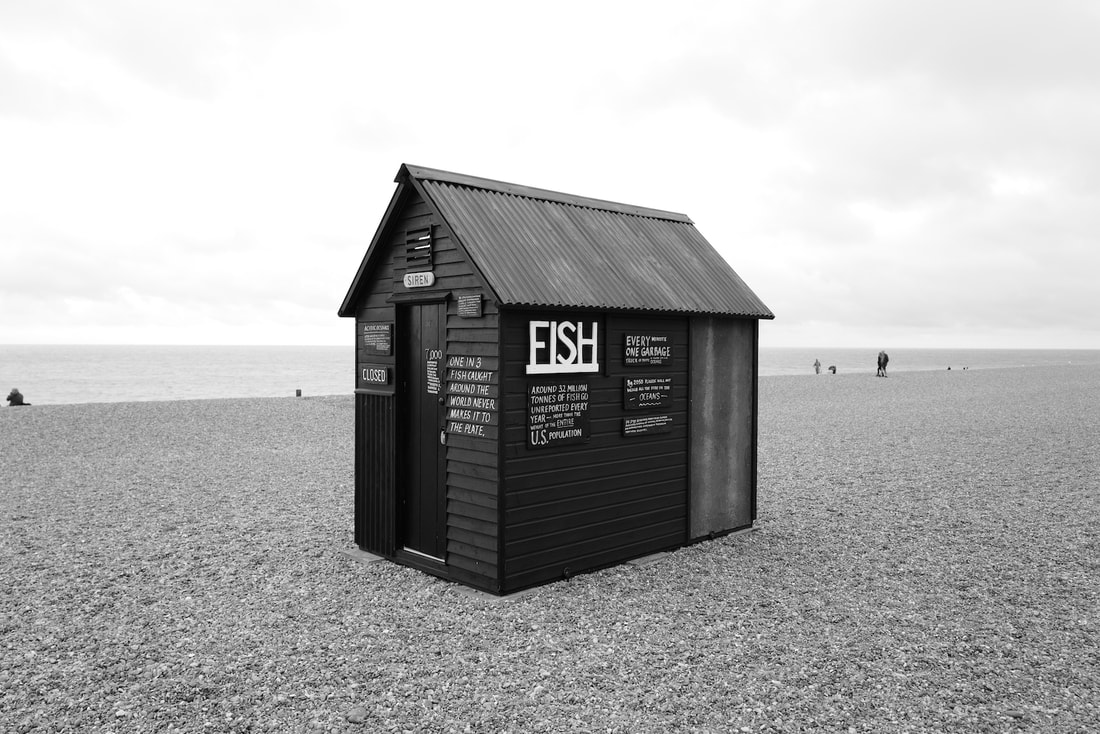 You feel you know the North Sea. Noisy and exhilarating in a full-on easterly, gently lapping and restful with a westerly. Not the aquamarine of Ionian waters, more the camouflage colours of grey-green and sandy waves pounding the pebbles. In Summer, young children toddling down to collect water in their buckets for purposes known only to them scream on cue as waves break near them. Little groups of holiday-makers along the beach, Londoners lily-white, keeping an eye on the youngest, contemplating the beauty; only a few swimming. An impressionist painting come to life. There’s life on the beach but not so much life in the water. Once in a while, the black doggy head of a patrolling solitary seal, checking you out before diving to periscope depth. Men line fishing early in the morning, escaping bored and fractious adolescents at home, are the first contemplatives on the beach, seem never to catch any fish larger than an inch or two. And only the soft, gelatinous bump of a Compass jellyfish by way of a brief encounter while you are swimming. That is the point; beneath the surface, even in the cradling, comforting vastness that is the sea, you sense something isn’t quite right. Roger Hardy’s disturbing art installation at Snape Maltings in Suffolk, outside the concert hall, until 11 September, tells you what’s wrong. In these lovely surroundings, Hardy’s message is shocking. He has built a typical Suffolk fisherman’s hut but with little carved figures made from wood found on the beach, lined up inside, looking out like the families who gaze at the sea on a hot day. On and around the hut Hardy has ‘chalked up’ information about fish and the oceans. Not fish that for sale and is available – fish that soon won’t be available. Some of the stark facts are reproduced below. They have been provided by the Siren Festival in Aldeburgh whose aim is to combine art and science to alert audiences to the perilous future facing our oceans. And they know what they are talking about. Let these alarming facts speak for themselves. Oceans are home to nearly 95% of all life on earth. They cover 70% of the earth’s surface but only 5% of them have been explored. 50% of our oxygen comes from plankton. Every second breath we take is given by the oceans One third of the world’s population lives near and on the coast. 1 in 3 fish caught around the world never makes it to plate. 32 million tonnes of fish caught annually go unreported (more than the weight of the entire US population). 38 million tonnes of sea creatures and 40% of the fish catch annually is unintentionally caught. [A tonne is a metric ton and equals c.2,205 pounds weight] Over a period of 3 days, 2,466 whales, porpoises and dolphins die due to entanglement in nets and as by-catch. Fish in the North Sea are moving North. 8 million metric tonnes of plastic are thrown into the oceans annually and 236,000 tonnes of this are the tiny particles of micro-plastics. Plastic debris causes the death of 100,000 marine mammals and a million sea-birds annually. Currently we are using more than 25% more natural resources than we can sustain. Leaders of different religions share the sense of alarm and add another dimension to these facts. Pope Francis in his encyclical Laudato Si, published in May 2015, quotes a canticle of St. Francis of Assisi which calls the Earth, our common home “a sister with whom we share our life and a beautiful mother who opens her arms to embrace us”. The Pope describes how in “tropical and subtropical seas, we find coral reefs comparable to the great forests on dry land, for they shelter approximately a million species, including fish, crabs, molluscs, sponges and algae. Many of the world’s coral reefs are already barren or in a state of constant decline”. “Who turned the wonderworld of the seas into underwater cemeteries bereft of colour and life?” the Pope asks, repeating a question posed as long ago as 1988 in a pastoral letter by the Catholic Bishops Conference of the Philippines. And he adds: “This phenomenon is due largely to pollution which reaches the sea as the result of deforestation, agricultural monocultures, industrial waste and destructive fishing methods, especially those using cyanide and dynamite. It is aggravated by the rise in temperature of the oceans”. You would have thought that turning our oceans into a warm toxic soup, with plastic added, ought to preoccupy our government more than escaping the EU’s regulatory Common Fisheries Policy (CFP). A final inconvenient truth for us in Britain, to quote the MEP, Richard Corbett, is that fish have “the unfortunate habit of swimming from one country’s waters to another”. 20% of fish caught by UK boats comes from outside our territorial waters. International law on fishing in the UN’s Convention on the Law of the Sea, designed to joint manage fishing fleets and conserve fish stocks, predates the EU. The Common Fisheries Policy (CFP) essentially follows the Law of the Sea provisions. So if we do leave the EU, Britain will remain bound by international regulations. And if we are to continue fishing, Britain will both have to abide by existing conservation rules and collaborate in developing further regulations to preserve fish stocks. We will neither rule the waves nor take back control of the oceans. Nor has the UK fared unjustly from the EU Common Fisheries policy: for example 84% of the haddock quota permitted in the total allowable catch per species (TAC) goes to the UK, worth 28,576 tonnes annually in 2015, alongside 34,066 tonnes of plaice, 28% of the TAC. We export 80% of the UK catch, mainly to Europe. The argument for BREXIT is, as usual, spurious. Leaving the CFP will change very little, and has the potential to undermine the recent stabilizing effect of the CPF on fish stocks in our European waters. That is enough facts for one day. But reiterating the facts above and the tragic future they foretell is not enough. What is needed is urgent action to save our oceans. From 1-27th October Roger Hardy’s installation will move to The Red House in Aldeburgh, Benjamin Britten’s House.
1 Comment
Janet Lash
3/9/2019 16:08:18
Depressing but very helpful in providing facts.
Reply
Leave a Reply. |
Archives
July 2024
Categories |

 RSS Feed
RSS Feed